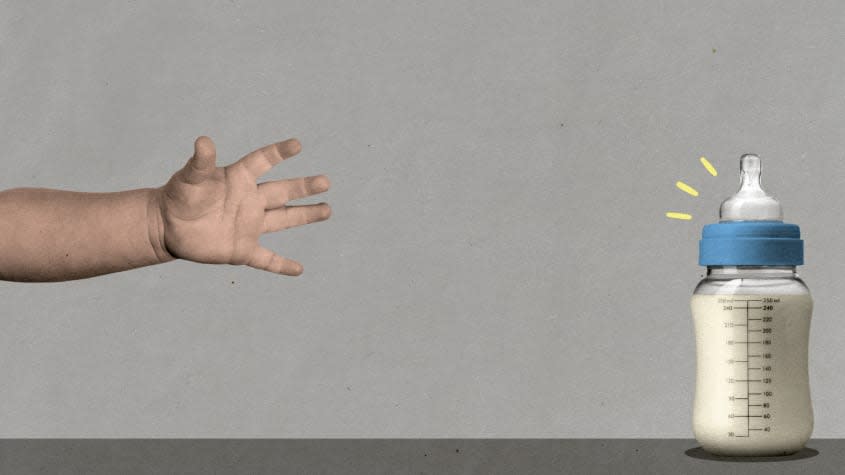Why is there a baby formula shortage?

The U.S. is in the midst of a worsening baby formula shortage, and parents nationwide are struggling to get their kids the nutrition they need. Here's everything you need to know:
Why is there a formula shortage?
There are two main reasons behind the formula shortage, The Wall Street Journal reports. First, knotted supply chains have made it difficult for parents to locate baby formula for months now. Between November 2021 and early April 2022, the out-of-stock rate for baby formula jumped to a whopping 31 percent, CNN reports, citing Datasembly.
But the situation worsened when the U.S. Food and Drug Administration (FDA) in February shut down a Sturgis, Michigan-based manufacturing plant belonging to Abbott Laboratories — a major player in the formula business — and recalled three of their powdered baby formula brands — Similac, Alimentum, and EleCare — due to potential bacterial infections. At least four babies were hospitalized and two died after consuming Abbott products, the FDA said.
Abbott later said that cronobacter sakazakii — the bacteria in question — was detected within "non-product contact areas" of the Sturgis plant, but not in the products. The manufacturer is now working with the FDA to restart production at the Sturgis plant and has said it's trying to increase production of Similac at other approved facilities, the Journal notes.
Likewise, Reckitt Benckiser, owner of the company behind formula brand Enfamil, has said its factories are churning out product seven days a week in hopes of filling empty shelves. But even with these efforts, shortages persist.
How are retailers responding?
Many are limiting how much formula parents can buy at once. Walgreens and CVS are limiting customers to three formula products per purchase. Target has restricted only online shoppers to a total of four formula items per sale, and Costco has listed various caps on its website, per The New York Times.
Is the government doing anything about it?
White House Press Secretary Jen Psaki said Monday that the FDA is doing everything it can to combat the shortage. "The FDA issued a recall to make sure that they're meeting their obligation to protect the health of Americans – including babies who, of course, were receiving or taking this formula – and ensure safe products are available. That's their job," she said. "Ensuring the availability is also a priority for the FDA and they're working around the clock to address any possible shortage."
The agency is also working with major manufacturers to increase production, Psaki said, and collaborating with the industry to "optimize suppy lines" and prioritize product lines, CNN summarizes.
As for Congress, HuffPost's Igor Bobic reported Monday that several senators seemed unaware there was a shortage at all. But others — mostly Republicans — have drawn attention to the issue online and called on the FDA to do more.
Some commentators have positioned the shortage as a direct failure of the FDA, whose regulatory hurdles may have compounded the problem. "U.S. officials could have made such shortages less likely by approving baby formula that is widely available in Europe, but per usual, the [FDA] has other priorities," Reason Magazine argued Tuesday.
Infant formula imports are also subject to tariff-rate quotas of 1.75 percent after certain thresholds are met, Eric Boehm posited recently for Reason, meaning American trade policy — certain facets of which predate both President Biden and former President Donald Trump — could be making things worse.
"Surely, protectionism isn't the only reason for the current formula crisis," Scott Lincicome of the Cato Institute told Boehm, "but it's just-as-surely making things worse."
What can parents do?
If you're a parent struggling to find formula for your child, don't panic just yet.
For starters, definitely don't try to DIY a solution, the Journal notes; making your own formula is dangerous and can lead to severe illness or death in infants. Also refrain from feeding your young child cow's milk or adding water into your powdered formula to make it last longer.
Instead, try talking with your pediatrician's office, which may have samples to offer. And when shopping, check smaller stores rather than national chains. So long as they don't have health issues, most babies can be safely switched from one brand of formula to another, Dr. Bridget Young, assistant professor at University of Rochester Medical Center, told the Journal — just check that the ingredients on the label are the same so as to avoid stomach aches. For other questions or concerns, check with the baby's doctor.
If your child does have health issues or requires specialty formula, check with your healthcare providers before making any changes to their formula routine.
You may also like
Biden announces free internet for millions of low-income Americans
Josh Hawley introduces bill that would strip Disney of Mickey Mouse copyright

